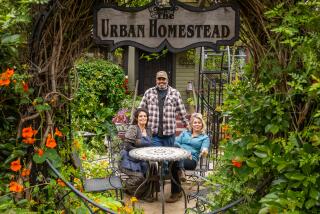Family That Moved From Primitive Appalachian Home Is Adjusting to Modern Life
SAND GAP, Ky. — Last June, Herman Isaacs moved his wife and seven youngest children from a primitive home in Appalachia’s remote Rock Lick Hollow to Sand Gap, where they are adjusting to electricity, phones, roads and school.
Before moving to a house on a paved road near Sand Gap, about 50 miles southeast of Lexington, the seven youngest Isaacs children had never been to school, had never been to a doctor and had no birth certificates or Social Security numbers. The only book they had known was the family Bible.
Eva Issacs, 45, who raised 16 children in the backwoods of Appalachia, said recently that she is not certain that modern conveniences have improved her life.
‘More Hectic Now’
“I liked the old ways, the kerosene lamps,” she said. “It’s more hectic now than our life was, getting up for school every morning.”
Issacs, 56, also feels the constraints of civilization.
“In some ways, I do have regrets,” he said. “I liked it better back where we were living. There was more freedom. The reason we never went to the doctor is we never had none sick. We’ve got real healthy kids. All our kids were born at home.”
Isaacs’s health prompted him to move from the hollow, where they walked nearly a mile up a steep mountain to reach a narrow track that snaked its way back and forth across a creek for another mile to the nearest blacktop road.
“I’m getting up in years, and we have to have some money to get by,” said Isaacs, who now works as a tobacco stripper in Lexington.
“Where we lived, we had to walk. When we had an automobile, we had to park it on the top of a mountain and walk up the creek to it. And we had this big old swinging bridge across the creek. We ain’t got that to worry about no more.”
Sending the youngest children--ages 5 to 15--to school was especially hard on Issacs and his wife.
Happy to See Bus Returning
“After we send the kids to school, we’re by ourselves,” she said. “It’s the first time that’s ever happened. We sure like to see that school bus come back in the afternoon.”
As the Isaacs children grew up and moved away, they began wanting an education.
Brenda Isaacs Walker, 27, the couple’s eldest daughter, was the first in the family to finish high school, winning a graduate equivalency diploma early this year.
“They came to my graduation” she said. “Things had changed that much from when I started.”
Isaacs said the children are adjusting to school.
“School was new to them for a while,” Isaacs said, “but they’re getting used to it. I ain’t heard no complaints; they all like it. Estes, my oldest boy going to school, just shook his head he doesn’t, but I think he does.”
Eva Isaacs agreed.
“Estes says he doesn’t like it too good, but he’s doing well, so he must like it all right,” she said of her 14-year-old son. “Since our oldest girl got her (diploma), we decided the others could get an education. They like being out here on the road too; they can get out more.”
Grew All Their Own Food
During more than 30 years of marriage, the Isaacs have lived far from grocery stores. They grew all their own food, putting up almost 1,500 jars every year, and made their own soap and brooms.
“Now I’ve got a vacuum cleaner,” Eva Isaacs said.
Herman Issacs said the family “has not changed all that much so far.”
“We still plan to raise most of our food and do our canning,” he said. “Really, we ain’t got adjusted to it yet.”
The couple married in 1956 after Isaacs was drafted into the Army and sent to Baltimore, where he met Eva, then a high school student. She dropped out after the 10th grade and moved with him to the mountains.
Most of Isaacs’s brothers and sisters never went to school. His father went to jail frequently for keeping his children out of school.
“He kept with it until they got tired of keeping him,” said Isaacs, who permitted only one book--the Bible--in the house until recently.
“We knew when we moved out we’d have to send them to school to keep from causing trouble,” Eva Isaacs said. “I’d teach them at home more than I did before because they really want to learn. But I wouldn’t send them if I didn’t have to.”
More to Read
Sign up for Essential California
The most important California stories and recommendations in your inbox every morning.
You may occasionally receive promotional content from the Los Angeles Times.










